Warning Letter For Late Coming
[Your Name]
[Your Title/Position]
[Company Name]
[Company Address]
[City, State, Zip Code]
[Date]
[Employee's Name]
[Employee's Position]
[Department]
[Company Address]
[City, State, Zip Code]
Subject: Warning Letter for Late Coming
Dear [Employee's Name],
I hope this letter finds you well. We write to address a matter of concern regarding your punctuality at work. It has come to our attention that you have been consistently arriving late to work in recent weeks. Punctuality is a critical aspect of maintaining a productive and efficient work environment, and tardiness can have a negative impact on both your own performance and the team's overall success.
While we understand that occasional unavoidable delays can happen, consistent late coming is not acceptable and can disrupt the smooth functioning of the company. It is essential for every employee to be present and ready to start work at the designated time. The company's policies and your employment contract clearly state the importance of punctuality and adherence to the set work hours.
To address this issue, we expect immediate improvement in your time management and adherence to the company's schedule. The following steps will be taken to ensure your promptness:
1. Monitoring Period: Over the next [specific time period, e.g., two weeks], we will closely monitor your attendance and punctuality.
2. Improvement Plan: We request you to create a detailed plan outlining steps you will take to ensure timely arrival at work. This may include setting multiple alarms, adjusting your morning routine, or seeking alternative transportation methods, if necessary.
3. Supervisor's Involvement: Your immediate supervisor will regularly follow up with you to assess your progress in adhering to the improvement plan and your overall punctuality.
4. Consequences: Failure to show significant improvement within the specified monitoring period may lead to further disciplinary action, up to and including termination of your employment.
We believe in providing our employees with every opportunity to excel, and we genuinely hope that this warning will serve as a wake-up call to rectify the issue promptly. Your punctuality and commitment to your work are essential to your professional growth and the success of our team.
Please sign and return a copy of this letter to acknowledge that you have received it and understand the expectations laid out. Should you wish to discuss this matter further or require any assistance in meeting the punctuality standards, please feel free to reach out to your supervisor or the Human Resources department.
We expect your cooperation in this matter and anticipate seeing a positive change in your timekeeping moving forward.
Sincerely,
[Your Name]
[Your Title/Position]
[Company Name]
-------------------------------------
[Employee's Signature] [Date]
Formal Warning Letter for Late Coming
Subject: Warning for Repeated Late Coming
Dear [Employee Name],
It has been observed that you have been arriving late to work on multiple occasions. Punctuality is crucial for maintaining workflow and team efficiency.
This letter serves as a formal warning. Continued tardiness may result in further disciplinary action, including suspension or termination as per company policy.
Please treat this matter seriously and ensure timely attendance going forward. Should there be any underlying issues affecting your punctuality, kindly discuss them with your supervisor immediately.
Sincerely,
[Manager Name]
[Title]
Informal Reminder Email for Late Arrival
Hi [Employee Name],
I noticed that you’ve been arriving late recently. Just a friendly reminder that timely arrival is important to keep our team on schedule.
Please try to arrive on time moving forward. Let me know if there’s any reason for the delays so we can help.
Thanks,
[Manager Name]
Second Warning Letter for Persistent Late Coming
Subject: Second Warning for Late Coming
Dear [Employee Name],
Despite the initial warning issued on [Date], it has come to our attention that your punctuality has not improved. Maintaining regular attendance is essential for your role and overall team performance.
This is your second formal warning. Any further instances of late arrival may result in stricter disciplinary measures.
We encourage you to take immediate corrective action. Please contact your supervisor if there are any difficulties affecting your timely attendance.
Sincerely,
[Manager Name]
[Title]
Casual Warning Message for Late Attendance
Hi [Employee Name],
We’ve noticed you’ve been late a few times this week. Please make sure to arrive on time to avoid any issues with attendance records.
Thanks for understanding.
[Supervisor Name]
Serious Warning Letter for Repeated Tardiness
Subject: Urgent Attention Required: Late Coming
Dear [Employee Name],
Your repeated late arrivals, most recently on [Dates], are affecting team productivity and operational efficiency. This is a serious matter requiring immediate correction.
Consider this a final warning. Continued tardiness may lead to suspension or termination in accordance with company policy.
Please meet with your supervisor to discuss any challenges you may be facing and to outline a plan for improvement.
Regards,
[Manager Name]
[Title]
What a Warning Letter for Late Coming Is and Why You Need It
- A formal document issued to an employee for arriving late to work repeatedly.
- Purpose: To notify the employee of unacceptable behavior, emphasize the importance of punctuality, and establish a record for potential disciplinary action.
- Helps maintain workplace discipline and operational efficiency.
Who Should Send a Warning Letter for Late Coming
- Immediate supervisors or team managers.
- Human Resources personnel responsible for disciplinary actions.
- Company officials authorized to address employee conduct.
Whom the Letter Should Be Addressed To
- The employee who has a record of arriving late.
- Consider addressing by name and including their department for clarity.
- Ensure the letter reaches the individual directly, maintaining confidentiality.
When to Issue a Warning Letter for Late Coming
- After repeated instances of late arrival despite informal reminders.
- When punctuality affects team performance or operational workflow.
- Following internal policy guidelines for progressive disciplinary actions.
How to Write and Send a Warning Letter for Late Coming
- Begin with a clear subject line indicating the purpose.
- Outline the instances of late arrival with specific dates if possible.
- Explain the impact of tardiness on work and team.
- Include a formal warning and potential consequences for continued lateness.
- Offer an opportunity to discuss challenges affecting punctuality.
- Deliver via email for quick acknowledgment or as a printed letter for official records.
How Many Warnings Are Typically Issued
- Initial informal reminder: 1–2 instances.
- First formal warning: after repeated late arrivals.
- Second or final warning: if behavior continues after the first warning.
- Progressive discipline policies may define specific thresholds for action.
Requirements and Prerequisites Before Sending
- Maintain accurate attendance records showing dates and times of late arrivals.
- Review company policies regarding tardiness and disciplinary procedures.
- Approval from HR or supervisor if required.
- Ensure the employee has been previously informed through informal reminders if applicable.
Formatting Guidelines for a Warning Letter
- Length: 1 page for formal letters; concise for emails or messages.
- Tone: Professional, serious, yet respectful.
- Wording: Clear, factual, and non-emotional.
- Style: Official for printed letters; simple and direct for emails.
- Include: Greeting, statement of issue, evidence of late coming, warning, consequences, and closing.
After Sending a Warning Letter for Late Coming
- Follow up with the employee to confirm receipt and understanding.
- Monitor attendance closely for improvement.
- Document any discussions, commitments, or repeated instances for HR records.
- Consider scheduling a meeting to provide support or guidance if necessary.
Pros and Cons of Issuing a Warning Letter for Late Coming
Pros:
- Clearly communicates expectations and consequences.
- Provides official documentation for HR and legal purposes.
- Encourages timely correction of behavior.
Cons:
- May create tension if perceived as punitive.
- Requires careful documentation and adherence to policy.
- Could impact morale if not handled professionally.
Tricks and Tips for Effective Warning Letters
- Be factual: Use specific dates and examples of late arrivals.
- Maintain a professional tone: Avoid emotional language or personal attacks.
- Include next steps and expectations for improvement.
- Keep a copy for records to protect both the company and employee.
- Offer support if lateness is due to legitimate issues (commute, health, family).
Common Mistakes to Avoid
- Sending a warning without prior informal reminders or documentation.
- Using vague or accusatory language.
- Neglecting to follow company policy on progressive discipline.
- Failing to specify consequences for continued tardiness.
- Overloading the letter with unnecessary details unrelated to the issue.
Elements and Structure of a Warning Letter for Late Coming
- Greeting: Directly address the employee.
- Subject line: Clearly indicate the purpose (e.g., “Warning for Late Coming”).
- Introduction: State the reason for writing the letter.
- Evidence: Include specific instances and dates of lateness.
- Impact: Explain how the behavior affects team or organization.
- Warning: Mention potential disciplinary consequences.
- Opportunity for Discussion: Encourage employee feedback if applicable.
- Closing: Professional sign-off with name and title.
- Attachments: Attendance records or policy references if necessary.
Does a Warning Letter for Late Coming Require Authorization?
- Usually requires approval or review by Human Resources or immediate supervisors.
- Ensures compliance with company policy and labor laws.
- Signature of authorized personnel strengthens the letter’s validity and record.

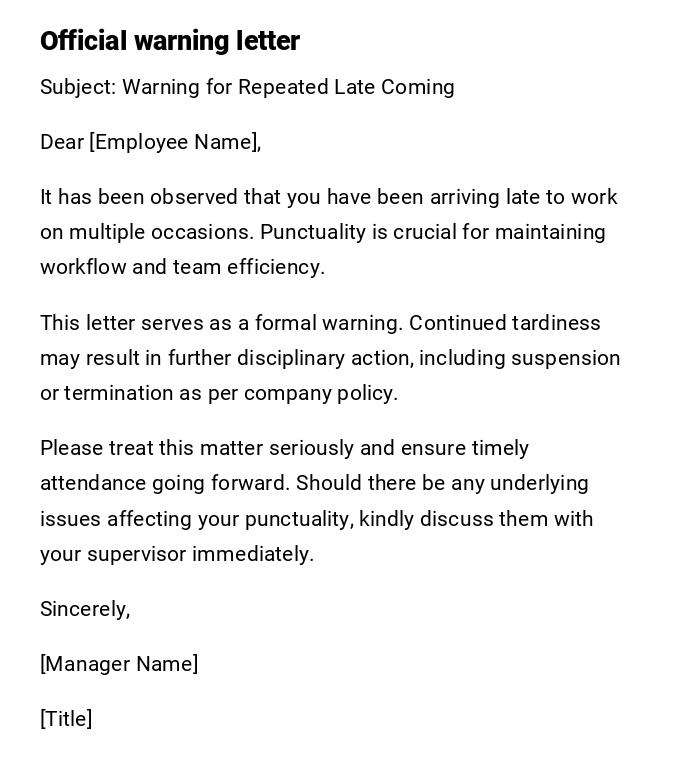
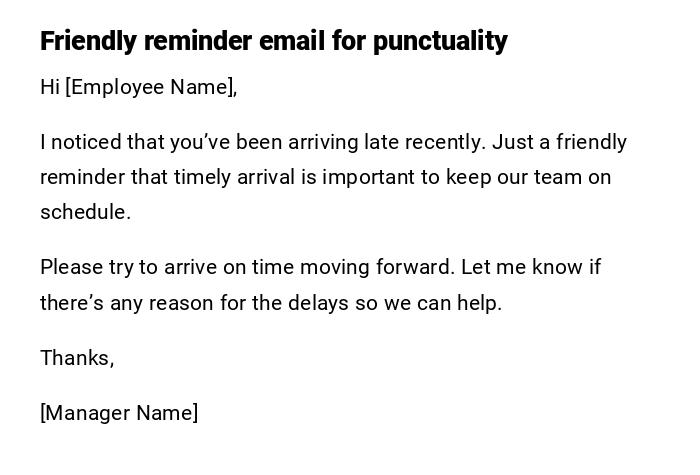
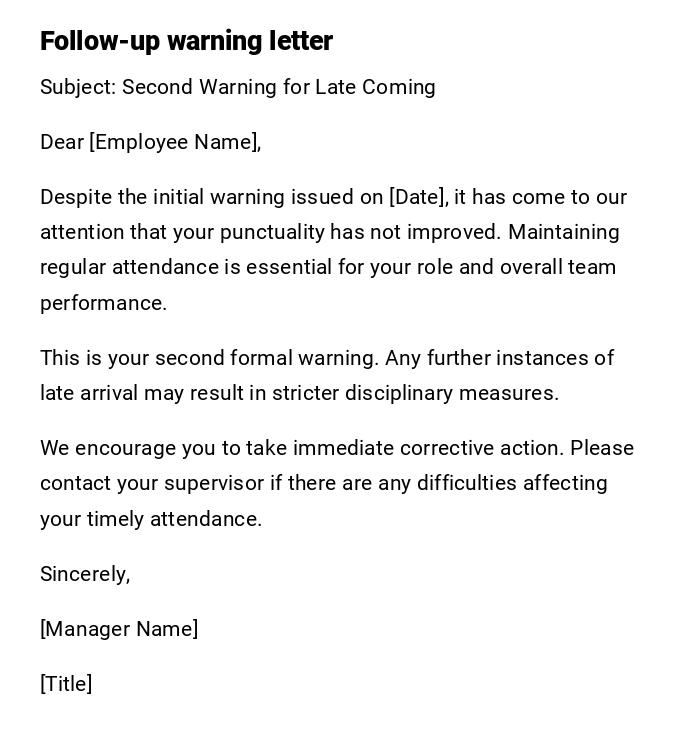
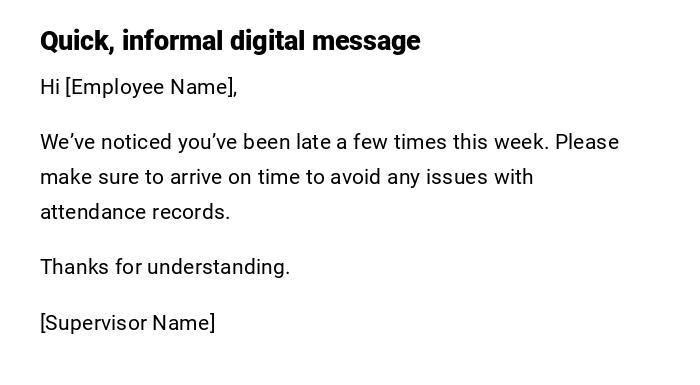
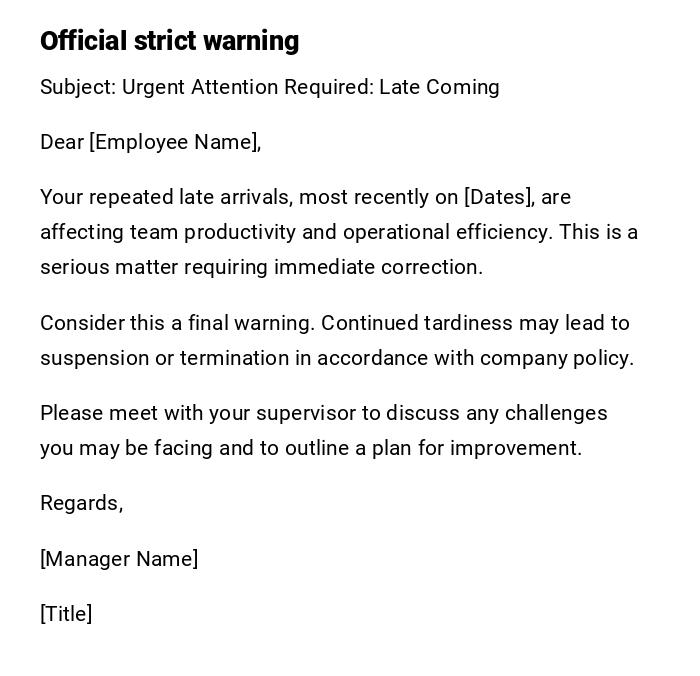

 Download Word Doc
Download Word Doc
 Download PDF
Download PDF